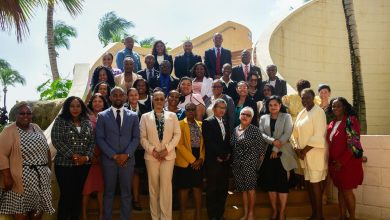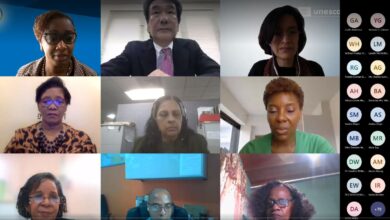ASG, Dr. Edward Greene
Minister Shaddik
Director, Jacqulyn Joseph
Excellencies and Distinguished Participants
As organizers of the V Ministerial Meeting held in Jamaica in the year 2000, the Caribbean countries lead the process that concluded the decade of the World Summit for Children and paved the way, with the Kingston Consensus, to the 2002 United Nations General Assembly first Special Session on Children. Both meetings had a common innovative approach: for the first time children and adolescents were allowed to participate in the adults’ deliberations as equals, exercising a fundamental right –the right to be heard and their opinions to be taken into account. The purpose of the two meetings was for Governments to report on their compliance with the Goals set to improve the lives of children around the World.
Great efforts where made by the CARICOM countries to comply with the commitments made in 1990 and with the 1993 ratification of the Convention on the Rights of the Child by the Commonwealth of the Caribbean. Important gains articulated through social policy initiatives were: “remarkably successful in the reduction of infant mortality, improvements in health and nutritional status of children, the provision of near universal primary education and the expansion of secondary schooling.”
In particular, Integrated Early Child Development (IECD) in some countries of the Caribbean, can become a sustainable success story and needs to be recognized and commended. For Governments in the region to prioritize the investment in a healthy, safe, nurturing and stimulating environment for all children from the beginning of their life and until they reach primary school and beyond is a political decision that will yield great returns to future generations. In fact, research indicates that for every dollar invested in IECD there is a seven-fold return in savings and productivity.
CARICOM, as an inter-governmental body, has embraced the IECD approach with the formulation of the Caribbean Plan of Action for Early Childhood Education, Care and Development and the creation of the University of West Indies’ Caribbean Child Development Centre. Jamaica has even formulated a National Plan of Action for Early Child Development! We should, therefore, underline the political will demonstrated in the region and be clear that the promises made require, in addition, a strong national follow-up with adequate financial investment in order to create sustainable social capital –the foundation of a vibrant society.
We are now in the post Special Session on Children era and we should seize the opportunity to materialize these efforts into concrete actions at the community level. For that to happen, we need the support of every family, teacher, politician, government official and state employee, every policeman, religious leader, CEO, magistrate, adult and parent in every Caribbean country. Your personal commitment today is going to be the engine that will lead the local movements in favor of children in every Parish. For this to happen, we as adults, need to normalize our relationship with our children and adolescents. Without us noticing it, the relationship with our children is becoming dysfunctional, as the adult world becomes more complex, more violent and its resources decline and threats grow.
In order to achieve a sustainable national development, we need to respect our past and present commitments with the children of today. The commitments we made are a minimal but fundamental set of agreements and standards that are embodied by the Convention on the Rights of the Child, the Kingston Consensus, the Millennium Goals and the World Fit For Children (WFFC). They will guide our way towards the realization of children’s rights, a prerequisite to achieve sustainable human development for all.
Let’s not forget that we also need to be vigilant and state out loud that it is not acceptable to live in a world where poverty, disparities and exclusions are increasing, becoming more dynamic and having the strongest impact on children, adolescents and women. Youth unemployment, growing violence, drug-addiction, the scourge of HIV/AIDS and the limitation of our societies to recognize the social role of adolescents are symptoms that lead to family and community disintegration.
In fact, we should look for partnerships between adolescents and adults to produce positive changes and develop constructive and creative visions of our collective future. Therefore, it is important that within our understanding of democratic education and citizenship development, we open clear and positive channels for child and adolescents participation in the decisions that will impact their future. We will thus allow them to become better adults than we, and creatively promote societies where solidarity between people and generations become the foundation of sustainable development and the architecture for a tangible realization of the human potential.
CARICOM is taking the lead and has the resolve to open the road for a better future for the children and adolescents of the Caribbean. Therefore, you now have the opportunity to launch a new vision based on the commitments of the present, the achievements of the past and strong of the lessons –both good and bad—of your experience. I understand that today, you will discuss the proposal for a regional framework based on the following guiding principles:
centering the interest of the child in the Caribbean agenda for development;
ensuring non-discrimination and the equal development and rights of all children;
rescuing children and youth who are “at risk” and ensure their rights and quality of life;
and promoting the participation of children, according to their evolving capacity, by enabling them to express their views, acquire knowledge, build self-esteem, and be fully involved in decision making that affects their life.
You will also analyze the following regional strategic priorities: Early Child Development; Adolescents, Participation and Life Skills (Health and Family Life Education); and Legislation, Child Rights and Child Protection. UNICEF global and regional priorities stated in the WFFC document and our Mid Term Strategic Plan (2002-2005) includes these issues and the Regional Office for Latin America and the Caribbean, as well as, our Country Offices are ready to assist you in achieving these important new objectives and priorities.
Before finishing, let me recognize the efforts that you are making and the ones that are still needed in the fight against HIV/AIDS. As Dr. Greene mentioned, CARICOM created the Pan Caribbean Partnership to fight HIV/AIDS and signed an agreement for subsidized ARVs. Moreover, Guyana has launched their manufacture and Jamaica and Haiti are utilizing the creative forces of their adolescents to promote multifaceted prevention strategies including access to confidential counseling through “hot lines” and the provision of “adolescent friendly” treatment when needed.
We also want to indicate that much work is still needed, for example, to overcome the stigmatization that seropositive and AIDS infected children and adolescents have to endure and to provide support to the orphans of parents who died of HIV/AIDS. But, we know that with solidarity, treatment and prevention education there is the possibility to revert the pandemic while respecting their rights; if action is taken without delay and in full force. UNICEF, as cosponsor agency of the UNAIDS programme, is also committed to assist you in this endeavor.
The latest thinking on the disease states that education for the prevention of HIV/AIDS should start at an early stage, before children and adolescents are exposed to risky situations and should be sustained through time. It should be complemented by measures focused on reducing individual risks and contextual, as well as, environmental and social vulnerabilities. Political leadership and commitment, participatory planning and inter-sectoral partnerships, within a rights based approach, are all essential components to give a successful and sustainable response to this tragedy.
As we can see, there is still much to do in order to develop the full potential and realize the rights of the children and adolescents of the world and of this region. Therefore, I thank you very much for the privilege to be part of this effort lead by CARICOM. By meeting here today you are providing a strong foundation to build together a bright future for the children of the Caribbean.





